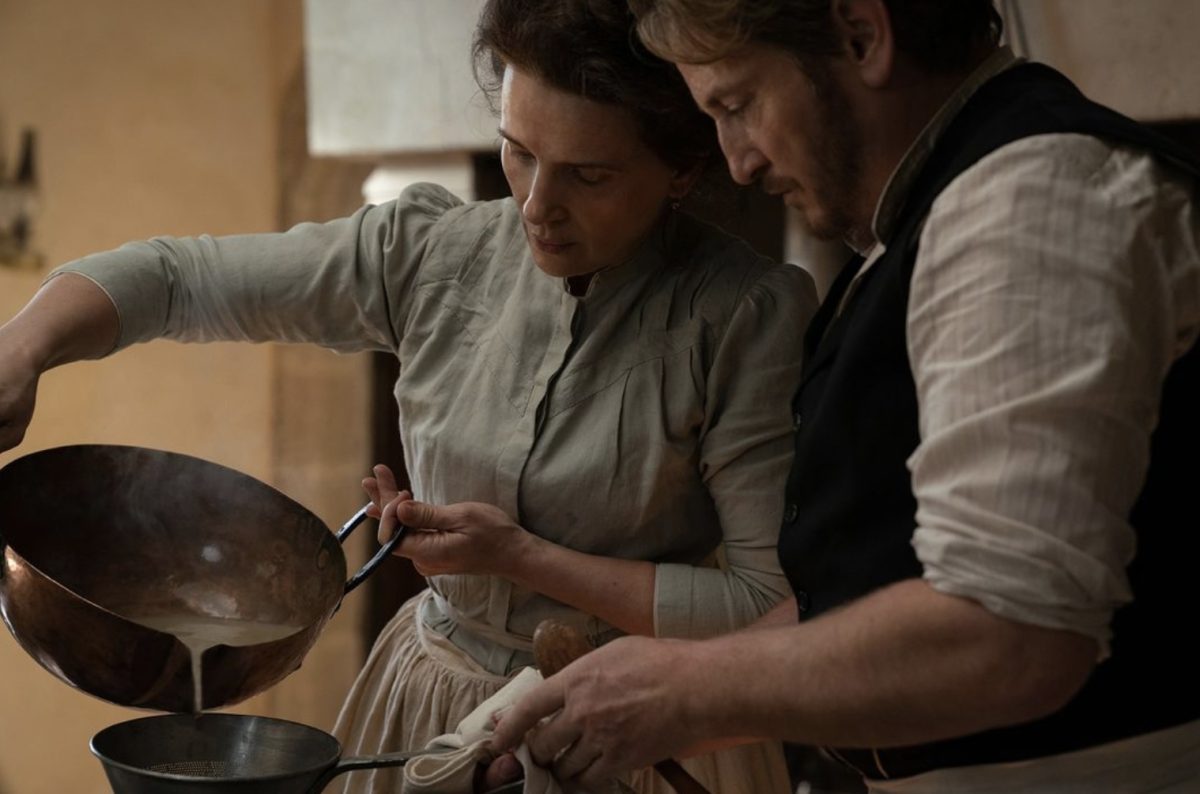A handful of freshly picked vegetables sizzle in the fiery embrace of a hot copper pan. A whisk flutters along the bottom of a metallic bowl as it is rapidly spun through creamy béchamel. A succulent rack of veal, seasoned with an array of fresh herbs, nestled upon a flagrant bed of onions, leeks, carrots and celery, then is tucked away in a cast iron oven to slow cook in a red wine sauce.
Amidst the rustic charm of a farmhouse kitchen, the film “The Taste of Things” opens with a carefully orchestrated 15-minute scene introducing us to personal chef Eugénie, played by Juliette Binoche, as she prepares a decadent multi-course feast. With a linen apron clinging to her waist and a messy updo perched atop her head, she elegantly whirls around the set alongside her employer and skilled gourmet, Dodin Bouffant, brought to life by the Benoît Magimel. As the camera pans in and out, the audience is enveloped in an immersive soundscape; the gentle hum of heavy breathing, the chirping of birds and the atmospheric music combine to create a sense of realism within the scene. Through this blend of immaculate visuals and ambient noise, director Tran Anh Hung transports audiences to the 1880s French countryside, blurring the line between reality and fantasy, orchestrating a sensory experience unlike any other.
The film centers on the long-standing romance of Eugénie and Dodin and their passion for meticulously crafting menus and basking in French culinary delicacies. Despite sharing over two decades together, Eugénie resists Dodin’s persistent proposals, cherishing her independence above all else. However, when Dodin prepares an elaborate dinner for her as a heartfelt gesture, Eugénie finds the allure of marriage growing increasingly irresistible.
As the film progresses, the characters are forced to face their changing reality, as Eugénie develops a mysterious illness involving frequent dizzy spells. Against the backdrop of a picturesque rural landscape, the movie offers a candid and close-up portrayal of this sizzling romance.
With sparse dialogue, the film leans heavily on the culinary arts to illustrate the unique chemistry between its characters. In a country fixated on fast-food culture and the ease of microwavable dinners, I was refreshed by the characters’ embrace of long, leisurely meals that symbolize their connections and togetherness. The film truly captures the significance of food in French culture, transcending its mere function of nourishment to emerge as an art form. It is no wonder that Anh Hung earned the coveted Best Director prize at the Cannes Film Festival last May and the film was chosen to be France’s submission to the international Oscar category (over “Anatomy of the Fall”).
Although “The Taste of Things” is a far cry from an action-packed film, it still manages to leave audiences enthralled and captivated. Much like French cuisine, which celebrates the beauty of simple, nourishing dishes crafted from high-quality ingredients, Anh Hung crafts an intimate portrayal of human connection through the art of simplicity. If you savor a heartfelt romance or culinary craftsmanship, “The Taste of Things” is a must-see cinematic experience.








































































































































































































